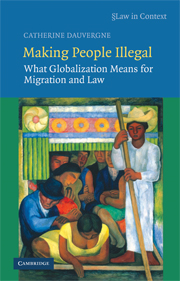Book contents
- Frontmatter
- Contents
- Acknowledgments
- Publication acknowledgments
- 1 Introduction
- 2 On being illegal
- 3 Migration in the globalization script
- 4 Making asylum illegal
- 5 Trafficking in hegemony
- 6 The less brave new world
- 7 Citizenship unhinged
- 8 Myths and Giants: The influence of the European Union and the United States
- 9 Sovereignty and the rule of law in global times
- Bibliography
- Index
- The Law in Context Series
- References
2 - On being illegal
Published online by Cambridge University Press: 05 June 2012
- Frontmatter
- Contents
- Acknowledgments
- Publication acknowledgments
- 1 Introduction
- 2 On being illegal
- 3 Migration in the globalization script
- 4 Making asylum illegal
- 5 Trafficking in hegemony
- 6 The less brave new world
- 7 Citizenship unhinged
- 8 Myths and Giants: The influence of the European Union and the United States
- 9 Sovereignty and the rule of law in global times
- Bibliography
- Index
- The Law in Context Series
- References
Summary
In September 2003, five Britons released their “No One Is Illegal!” manifesto. With the opening salvo, “For a world without borders! No Immigration controls!” they called for the elimination of all border controls, for opposition to all deportations and for a massive trade union campaign to organize undocumented workers. Their opposition to border controls is grounded in a conviction that immigration laws cannot be “reformed” in a way that will meaningfully sever them from what they label racist and fascist origins. The “No One Is Illegal” manifesto asserts the impossibility of grounding thoroughgoing reform in compassionate exceptions to the immigration laws, and the inability of liberalism to do more than reinforce a demarcation between inclusion and exclusion. Beginning in 2002, “No One Is Illegal” groups began to make their voices heard in a number of Canadian cities. The Canadian groups identify themselves as a “campaign” and, in a perhaps typically Canadian political posture, take a less ideologically articulated position than the British group. The Canadian groups do not, for example, highlight an opposition to all forms of immigration control. They instead focus on a broad integration of social justice issues:
The No One Is Illegal campaign is in full confrontation with Canadian colonial border policies, denouncing and taking action to combat racial profiling of immigrants and refugees, detention and deportation policies, and wage-slave conditions of migrant workers and non-status people.
We struggle for the right of our communities to maintain their livelihoods and resist war, occupation, and displacement, while building alliances and supporting indigenous sisters and brothers also fighting theft of land and displacement.
- Type
- Chapter
- Information
- Making People IllegalWhat Globalization Means for Migration and Law, pp. 9 - 28Publisher: Cambridge University PressPrint publication year: 2008

